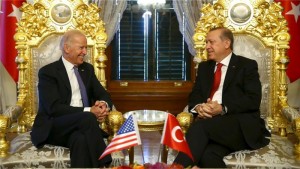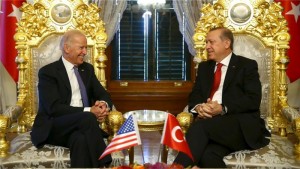- The US leadership should see Turkey in a new light and revise
the usual parameters of engagement.
Al Jazeera
Gulnur Aybet
 The relations of Turkey and the United States were not in a very good state before the failed coup attempt on July 15. However, since then relations have taken a turn for the worst. As Vice President Joe Biden visits Turkey today, he is facing four pressing items on the agenda.
The relations of Turkey and the United States were not in a very good state before the failed coup attempt on July 15. However, since then relations have taken a turn for the worst. As Vice President Joe Biden visits Turkey today, he is facing four pressing items on the agenda.
The first is the Turkish request for the extradition of Fethullah Gulen, who is widely believed to be the hand behind the failed coup attempt.
There was already an ongoing investigation against Gulen before the coup attempt, and on May 26 the Turkish National Security Council officially labelled the organisation as a terrorist group – the Fethullah Terrorist Organisation (FETO), to be disbanded as a primary threat to Turkey’s national security.
Further evidence coming from the testimonies of the arrested coup plotters indicates without a doubt that FETO was behind the coup attempt.
Extradition of Gulen
There is an extradition agreement between the US and Turkey that has been in force since 1981. According to this agreement, which does not cover political convictions, Turkey has now made an official request for the extradition of Gulen and has forwarded evidence to this effect.
This will be followed up with a legal process in the US, which could take time. The expected legal process needs to be better explained to the Turkish public, among which there is a heightened sensitivity about the matter.
A US Justice Department delegation is already in Ankara ahead of Biden’s visit to discuss the details of the case with its Turkish counterparts.
However, from Turkey’s perspective, the US leadership appears to have a nonchalant attitude towards the extradition request.
Whether this is true or not, it is up to the US authorities to convince their Turkish counterparts that they are taking the matter seriously and are urging the legal process to move with the upmost speed. Much of this convincing will fall on Joe Biden during his visit.
War against ISIL
The second pressing item on the agenda is the war in Syria and the US-backed advance of predominantly People’s Protection Units (YPG)-dominated Syrian Democratic Forces (SDF).
When the SDF seized control of Manbij from the Islamic State of Iraq and the Levant (ISIL, also known as ISIS) on August 13, this crossed Turkey’s red line that the YPG should stay on the east of the Euphrates.
The US promised that once these areas are cleared of ISIL, YPG units would go back to the east of the Euphrates.
That promise, fragile at best, does not seem to be holding as YPG units advanced further north towards the Turkish border and prompted Turkish cross-border artillery fire into Syria against both YPG and ISIL positions.
As the Turkish army units amass at the border near Jarablus, it is a warning sign that Turkey will try to prevent the joining of YPG-held areas adjacent to the Turkish border from Jarablus to Marea.
Turkey does not wish to see a contiguous YPG-controlled territory running adjacent to its 911km border with Syria, and considers this a national security priority because it views the YPG and the Kurdistan Workers’ Party (PKK) as one and the same. The PKK is considered a terrorist organisation not just by Turkey but also by the US and the European Union.
Although the US is also fully aware of this fact, it still insists that since there are no other ground forces they can rely on in the fight against ISIL, they will continue to train and back the YPG, much to the frustration of Turkey.
One issue that needs to be communicated carefully during this visit is who will control the territories liberated from ISIL.
As far as Turkey is concerned this cannot be the YPG. But alternatives also look grim as the opposition forces are far from these areas and are considerably weakened by the pounding of the regime. Perhaps a peacekeeping force in which Turkey also takes part – or leads – could be approved by the United Nations.
With the commencement of Turkey’s operation to Jarablus, this looks like a more realistic alternative.
Especially in light of the recent Turkish-Russian rapprochement, this might be a possibility, given not just Russia’s permanent seat on the UN Security Council, but also its clout over the Bashar al-Assad regime.
The status of the Incirlik airbase
The third issue is surfacing US concerns over the Incirlik airbase, controlled by the Turkish and US air forces.
Given the fact that power was cut to the base after the failed coup, and the Turkish commander of the base, Bekir Ercan Van, was arrested as one of the plotters – who gave the permission for a a tanker plane to take off and support rogue fighter jets on the night of the coup attempt – some US analysts are concerned about the safety of US nuclear weapons stored in the base.
Since there are no aircraft capable of delivering nuclear weapons in Incirlik, the bombs are mainly there for storage. Furthermore, they cannot be activated without a code.
But the latest developments have opened up the debate on their exact purpose there. If they are to enhance deterrence, one has to ask, deterrence against whom?
It seems that after the failed coup, there will be an increasing questioning about the utility of storing these weapons on the base, even though for Turkey stationing nuclear warheads has symbolically solidified the US-Turkish strategic partnership.



